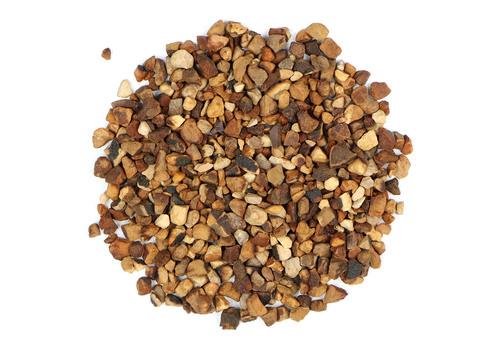Kola Nut - COLA NITIDA
(Cut & Sifted) (Organically Grown) Available in 1OZ.
COMMON NAME
Standardized: cola
Other: ghanja cola, kola
BOTANICAL NAME
Cola nitida (Vent.) A. Chev.
Plant Family: Sterculiaceae
INTRODUCTION
Tropical Africa is the native home of the towering kola tree growing up to 40 feet (13 meters) tall. Its yellow flowers tinged with purple bear reddish-brown seeds about the size of a walnut with almost no taste but rich in caffeine. The Igbo, a tribe in southern Nigeria, consider the kola nut tree to be the first tree (and fruit) on earth. They consider the nut to be a symbol of hospitality, kindness and fraternity. Throughout Western Africa, a small piece of nut is chewed before each meal to promote digestion. It was introduced to Europe in the mid 16th century by Portuguese traders. The nut is also thought to improve the flavor of any food and to counteract the effects of drinking tainted water.
CONSTITUENTS
Caffeine, starch, sugar.
PARTS USED
The whole nut. The nuts, either whole or cut retain their caffeine content better than kola nut powder and it is recommended that you grind your Kola immediately before using.
TYPICAL PREPARATIONS
Kola, as its name suggests, is a main ingredient in many traditional colas. In herbal medicine, the nut is usually soaked in alcohol to make tinctures. May be taken as tea although bitter, and the powder can be taken as a capsule.
SUMMARY
Kola nut was used as the main ingredient in cola drinks for many years, but is now mainly used as a flavoring agent.
PRECAUTIONS
Specific: Contains caffeine, a nervous system stimulant. Excessive use of caffeine can cause insomnia, nervousness, increase heart rate and the other symptoms of excess caffeine intake. Exercise caution when using with other central nervous stimulants, including bronchodilators or adrenergic drugs.
General: We recommend that you consult with a qualified healthcare practitioner before using herbal products, particularly if you are pregnant, nursing, or on any medications.
*These statements have not been evaluated by the Food and Drug Administration. These products are not intended to diagnose, treat, cure or prevent any disease.*
